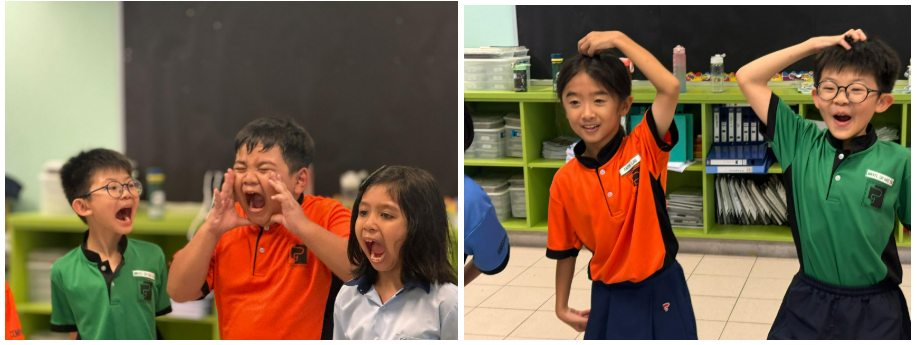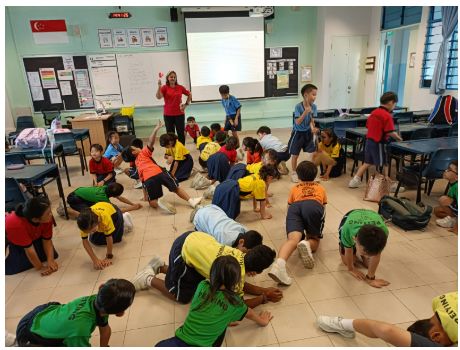English Language
English Language
|
Head of Department |
Mdm Haniza
|
|
Senior Teacher |
Dr Chin Yoke Mui
|
|
Coordinator |
Ms Koo Ying Jia |

We aim to
-
foster a love for reading and an appreciation of diverse literary genres in every child
-
cultivate confident speakers and writers by providing a language-rich environment.
-
equip pupils with critical thinking skills essential for making informed judgments in a globalised world.

Strategies for English Language Learning And Reading (STELLAR)
The STELLAR Curriculum aims to:
strengthen both language and reading skills as well as promote a positive attitude towards reading in the foundational years through a variety of learner-centred and developmentally appropriate pedagogical approaches using age-appropriate authentic children's literature.
The STELLAR pedagogic model for lower primary is made up of three major teaching strategies:
-
Shared Book Approach (SBA)
-
Modified Language Experience Approach (MLEA)
-
Learning Centres (LC)
The STELLAR pedagogic model for upper primary is made up of three major teaching strategies:
-
Sustained Silent Reading (SSR) (Supported Reading, KWL, Retelling)
-
Writing Process Cycle (WPC)
-
Differentiated Instruction (DI)
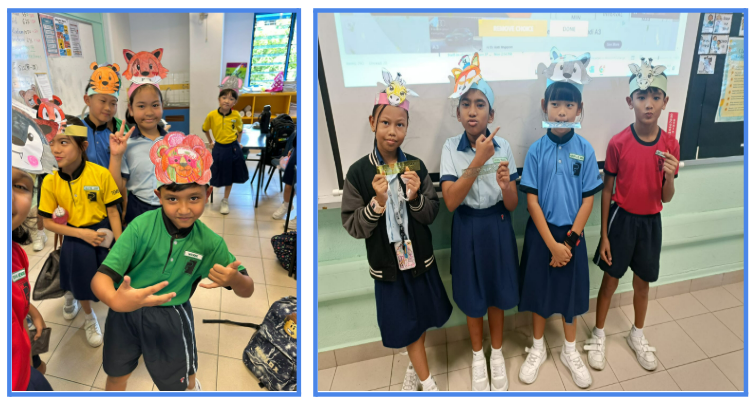
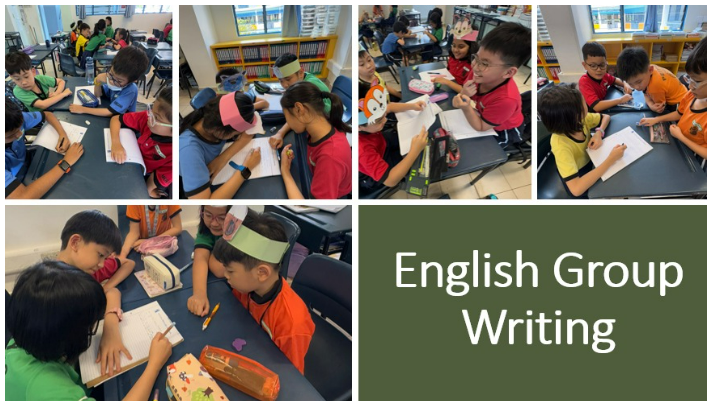
Group Writing for MLEA
EL Fiesta
The Language Fiesta, a month-long event featuring a variety of activities, is organised to help pupils to learn the English Language in a fun way. It is in line with the national Speak Good English Movement, with the objective of encouraging pupils to use grammatically correct English that is universally understood. Throughout April, all pupils are involved in a host of engaging EL activities at every level to raise awareness of the importance of English Language, and encourage pupils to continue to speak and write standard English throughout the year.
Various fun and meaningful activities are organised, which include Oratorical Contest, Reader's Theatre, Choral Reading, Spelling Bee, quizzes and games. English game booths, designed and conducted by the EL Club members and EL Ambassadors feature fun language games for the pupils to play during recess.
Characters from popular children’s books also come alive, such as Pinocchio and Little Red Riding Hood, as they mingle among the Peiying students and converse about their storybook roles.’

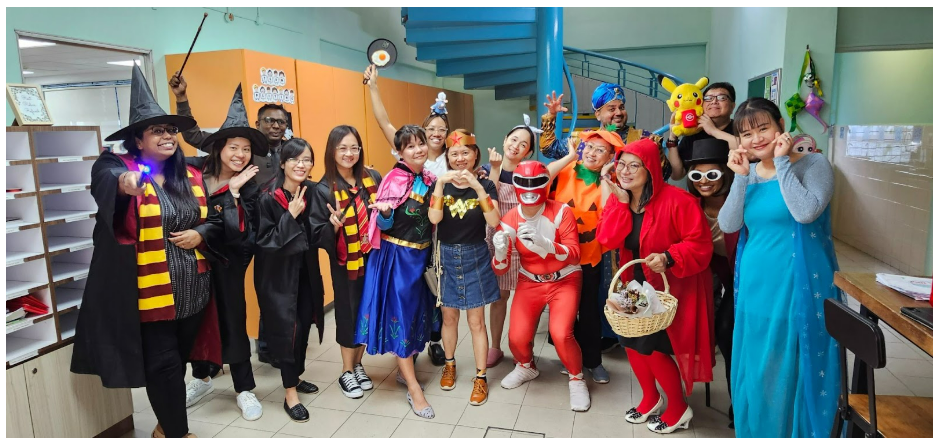
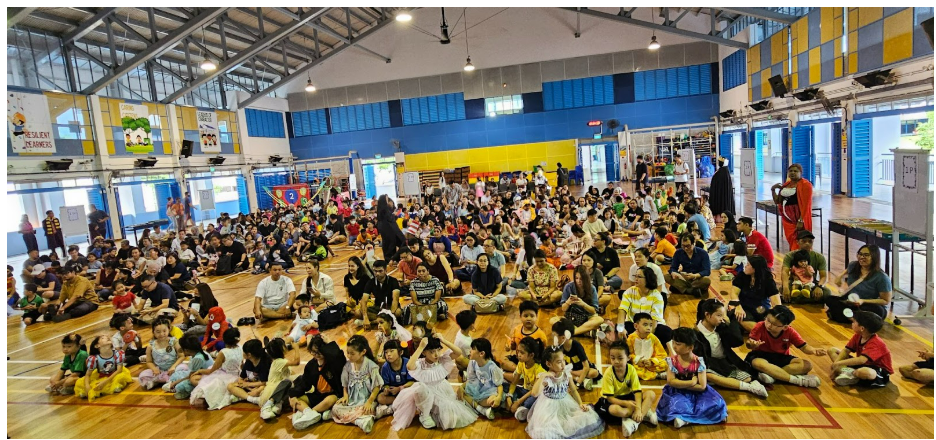
Parents and P1 students at the inaugural Read@Peiying event
English Reading Programmes @ Peiying
Extended Reading Programme
A wide selection of engaging books is available for all levels across the school. These books are housed in the classroom library corners, where English Ambassadors oversee the borrowing and loaning process.
The programme is integrated with the Peiying Reader Card reading activity, which motivates pupils to complete a series of tasks related to their reading. Activities such as designing a poster based on the book or writing a letter to the main character are tailored to accommodate different learning abilities and interests, ensuring a meaningful and enjoyable reading experience for every student.
Let’s Read Programme
The subscription to the Little Red Dot newspaper ensures that Primary 4, 5, and 6 students are consistently exposed to current affairs and expository writing throughout the year. Through engaging, age-appropriate articles, students enhance their grammar and vocabulary while deepening their understanding of various topics.
Additionally, National Education messages are seamlessly incorporated into English lessons, fostering meaningful discussions on themes highlighted in each issue.
The Reading Programme gives exposure to P1, P2 and P3 pupils to a wide variety of text types, such as storybooks and magazines. It promotes reading and fosters a love of books and literature through motivating stories.
Media Resource Library (MRL) - READ @ Peiying
READ @ Peiying refers to Reading Extensively Aids UnDerstanding both in and out of the classrooms. The MRL believes in the whole-school approach to develop a school-wide reading culture, so students would need access to a wide variety of books and school-wide programmes, and initiatives should be made available with a structured time set aside to allow for reading for pleasure.
These initiatives include
-
providing ERP books for their class libraries
-
Pocket-Size Programmes on various genres
-
Guest Readers who conduct storytelling for P1 to P3
-
Organising a Mobile Library every month at the canteen
-
Blind date with a book
The school also partners with public libraries to conduct reading activities.
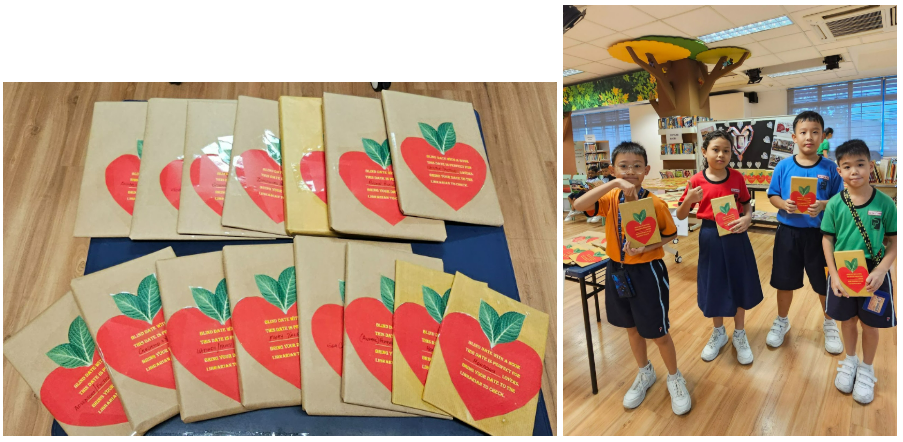
P3 and P4 Oracy Programme
To promote oracy among students, the English Department organises an annual enrichment workshop for Primary 3 and Primary 4 students.
Primary 3 students participate in Readers’ Theatre, where they learn to express themselves confidently, clearly, eloquently, and with appropriate expression. The workshop also introduces various vocal techniques to help them effectively bring stories to life.
Primary 4 students attend a Public Speaking workshop which equips them
with essential skills to become empathetic and effective communicators.
Through positive reinforcement, the workshop boosts their confidence and
motivation, enabling them to deliver a speech with impact.
